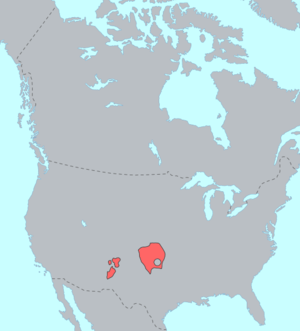カイオワ・タノ語族
| カイオワ・タノ語族 | |
|---|---|
| Kiowa–Tanoan, Tanoan | |
| 話される地域 | 北アメリカ中央部 |
| 言語系統 | (fam1 または family を指定して下さい)
|
| 下位言語 | |
| Glottolog | kiow1265[1] |
 ヨーロッパ人と接触する前のカイオワ・タノ語族の分布。左側がプエブロの言語;右側が遊牧民の話すカイオワ語。 | |
カイオワ・タノ語族、カイオワ=タノ語族(Kiowa–Tanoan)、タノ=カイオワ語族(Tanoan–Kiowa)、タノ語族(Tanoan [təˈnoʊ.ən])は現在のニューメキシコ州、カンザス州、オクラホマ州、テキサス州の先住民が話す言語からなる語族である。
ティワ語(タオス、ピクリス、南ティワ)、テワ語、トワ語といった大部分の言語は、ニューメキシコ州のネイティブ・アメリカンのプエブロ(離れたアリゾナ州にもいる)によって話されている。これらの言語を総称してタノ語族と呼んだのが最初である。関連する言語であるカイオワ語は現在オクラホマ州南西部で主に話されている。カイオワは歴史的にテキサス州とオクラホマ州の地域を占領していた。
言語
[編集]カイオワ・タノ語族には、4つの語派に7つの言語が存在する。
ティワ=テワと同様に、カイオワ=トワは中間の語派を形成する可能性がある。
名称
[編集]タノ語族は、ティワ語、テワ語、トワ語からなるプエブロの言語中の主要な語族として長い間認識されてきた。カイオワ語の語族への編入は当初、言語学者の間で議論を呼んだ。かつては遊牧民であった平原のカイオワは、ティワ、テワ、トワのようなプエブロとは文化的に全く異なり、他の語族の言語を話す人々とより多くの文化を共有してきた。言語学者は現在、カイオワ語を含まないタノ語族は側系統群であり、プエブロの言語の祖語はカイオワ語の祖語と同じであると考えている。カイオワ語とトワ語の関係はトワ語とティワ=テワ語派の関係よりも近いかもしれない。専門的には、タノ語族 Tanoanとカイオワ・タノ語族 Kiowa–Tanoanは言語学者の間では同義語と考えられている。一つの文化を共有する複数の民族を意味するTanoanという名前が文化的に使用されているため、Kiowa–Tanoanというより明確な用語が、今でも語族に対して一般的に使用されている。
カイオワの人々の前史はほとんど知られていない。その結果、この語族の構成員が根本的に異なる生活様式を持つ二つのグループ(「プエブロ」 と 「プレーンズ」)に分かれたことについて、歴史ははっきりしない。どうやら、民族間の古代のつながりについての口頭伝承は存在しないようだ。学者たちは、共通の言語的特徴が発達するように、民族がいつ接触したかを決定していない。最初期のカイオワの伝統と歴史的記録は、彼らが北と西に移動し、現在の部族ネーションと結びついている領土に入ったと記録している。現在、この地域はテキサス州とオクラホマ州に属しており、18世紀後半から占拠されていた。
系統関係
[編集]カイオワ・タノ語族は、アステカ=タノ語族の仮説の提案の中で、ユト・アステカ語族と結びついている。この仮説は証明されていないが、多くの言語学者が有望であると考えている。
音韻史
[編集]下の表[2]は、語幹の語頭での子音の対応に基づいてHale(1967)によって再構されたタノ祖語の子音を含む。
*ɡの証拠は接頭辞に由来する。*ɡは、語幹の語頭では見つからないため、上記の表では括弧内にある。ヘイルは鼻母音から鼻音化の特徴を再構する。母音の長さ、声調、強勢などの母音音質や韻律的特徴は、カイオワ・タノ語族ではまだ再構されていない。Hale (1967)は、母音品質の特定のセットを提供する。
次の表は、カイオワ・タノ祖語に再構された頭子音と娘言語におけるその反映を示している。
上記の表に見られるように、多くの音韻融合がさまざまな言語で発生している。上記を支持する同根語のセットは以下のとおり。
脚注
[編集]- ^ Hammarström, Harald; Forkel, Robert; Haspelmath, Martin et al., eds (2016). “Kiowa–Tanoan”. Glottolog 2.7. Jena: Max Planck Institute for the Science of Human History
- ^ The original Americanist phonetic symbols differ from the IPA: Amer. ⟨c⟩ = IPA ⟨ts⟩, Amer ⟨ʒ⟩ = IPA ⟨dz⟩.
書誌情報
[編集]- Campbell, Lyle. (1997). American Indian languages: The historical linguistics of Native America. New York: Oxford University Press. ISBN 0-19-509427-1.
- Cordell, Linda A. (1979). Prehistory: Eastern Anasazi. In A. Ortiz (Ed.), Handbook of North American Indians: Southwest (Vol. 9, pp. 131–151). Washington, D.C.: Smithsonian Institution.
- Davis, Irvine. (1959). Linguistic cues to northern Rio Grande prehistory. El Palacio, 66 (3), 73-84.
- Davis, Irvine. (1979). The Kiowa–Tanoan, Keresan, and Zuni languages. In L. Campbell & M. Mithun (Eds.), The languages of native America: Historical and comparative assessment (pp. 390–443). Austin: University of North Texas.
- Dozier, Edward P. (1954). The Hopi-Tewa of Arizona. University of California Publications in American Archaeology and Ethnology, 44 (3), 259-376.
- Eggan, Fred. (1979). Pueblos: Introduction. In A. Ortiz (Ed.), Handbook of North American Indians: Southwest (Vol. 9, pp. 224–235). Washington, D.C.: Smithsonian Institution.
- Ellis, Florence Hawley. (1967). Where did the Pueblo people come from? El Palacio, 74 (3), 35-43.
- Ford, Richard I.; Schroeder, Albert H.; & Peckham, Stewart L. (1972). Three perspectives on Puebloan prehistory. In A. Ortiz (Ed.), New perspectives on the Pueblos (pp. 19–39). Albuquerque: University of New Mexico Press.
- Foster, Michael K. (1999). Language and the culture history of North America. In I. Goddard (Ed.), Handbook of North American Indians: Languages (Vol. 17, pp. 64–110). Washington, D.C.: Smithsonian Institution.
- Hale, Kenneth L. (1962). Jemez and Kiowa correspondences in reference to Kiowa–Tanoan. International Journal of American Linguistics, 28 (1), 1-5.
- Hale, Kenneth L. (1967). Toward a reconstruction of Kiowa–Tanoan phonology. International Journal of American Linguistics, 33 (2), 112-120.
- Hale, Kenneth L. (1979). Historical linguistics and archeology. In A. Ortiz (Ed.), Handbook of North American Indians: Southwest (Vol. 9, pp. 170–177). Washington, D.C.: Smithsonian Institution.
- Harrington, J. P. (1910). On phonetic and lexic resemblances in Kiowan and Tanoan. American Anthropologist, 12 (1), 119-123.
- Harrington, J. P. (1928). Vocabulary of the Kiowa language. Bureau of American Ethnology bulletin (No. 84). Washington, D.C.: U.S. Govt. Print. Off.
- Hill, Jane H. (2002). Toward a linguistic prehistory of the Southwest: "Azteco-Tanoan" and the arrival of maize cultivation. Journal of Anthropological Research, 58 (4), 457-476.
- Hill, Jane H. (2008). Northern Uto-Aztecan and Kiowa–Tanoan: Evidence of contact between the proto-Languages? International Journal of American Linguistics, 74 (2), 155–188.
- Kinkade, M. Dale; & Powell, J. V. (1976). Language and prehistory of North America. World Archaeology, 8 (1), 83-100.
- Leap, William L. (1971). Who were the Piro? Anthropological Linguistics, 13 (7), 321-330.
- Miller, Wick R. (1959). A note on Kiowa linguistic affiliations. American Anthropologist, 61 (1), 102-105.
- Mithun, Marianne. (1999). The languages of Native North America. Cambridge: Cambridge University Press. ISBN 0-521-23228-7 (hbk); ISBN 0-521-29875-X.
- Mooney, James. (1898). Calendar history of the Kiowa Indians. In 17th annual report of the Bureau of American Ethnology for 1895-1896 (Part 1, pp. 129–445). Washington, D.C.
- Mooney, James. (1907). Kiowa. In F. W. Hodge (Ed.), Handbook of American Indians (Part 1, pp. 669–701). Bureau of American Ethnology bulletin (No. 30). Washington, D.C.
- Newman, Stanley S. (1954). American Indian linguistics in the Southwest. American Anthropologist, 56 (4), 626-634.
- Nichols, Lynn. (1994). Subordination and ablaut in Kiowa–Tanoan. Southwest Journal of Linguistics, 13, 85-99.
- Nichols, Lynn. (1996). Toward a reconstruction of Kiowa–Tanoan ablaut. In Proceedings of the 22nd annual meeting of the Berkeley Linguistics Society.
- Plog, Fred. (1979). Prehistory: Western Anasazi. In A. Ortiz (Ed.), Handbook of North American Indians: Southwest (Vol. 9, pp. 108–130). Washington, D.C.: Smithsonian Institution.
- Reed, Erik K. (1949). Sources of upper Rio Grande Pueblo culture and population. El Palacio, 56 (6), 163-184.
- Snow, Dean R. (1976). The archaeology of North America. New York: The Viking Press.
- Trager, George L. (1942). The historical phonology of the Tiwa languages. Studies in Linguistics, 1 (5), 1-10.
- Trager, George L. (1951). Linguistic history and ethnologic history in the Southwest. Journal of the Washington Academy of Science, 41, 341-343.
- Trager, George L. (1967). The Tanoan settlement of the Rio Grande area: A possible chronology. In D. H. Hymes & W. E. Bittle (Eds.), Studies in southwestern ethnolinguistics: Meaning and history in the languages of the American Southwest (pp. 335–350). The Hague: Mouton.
- Trager, George L. (1969). Taos and Picuris: How long separated. International Journal of American Linguistics, 35 (2), 180-182.
- Trager, George L.; & Trager, Edith Crowell. (1959). Kiowa and Tanoan. American Anthropologist, 61 (6), 1078-1083.
- Wendorf, Fred. (1954). A reconstruction of northern Rio Grande prehistory. American Anthropologist, 56 (2), 200-227.
- Wendorf, Fred; & Reed, Erik K. (1955). An alternative reconstruction of northern Rio Grande prehistory. El Palacio, 62 (5/6), 131-173.
